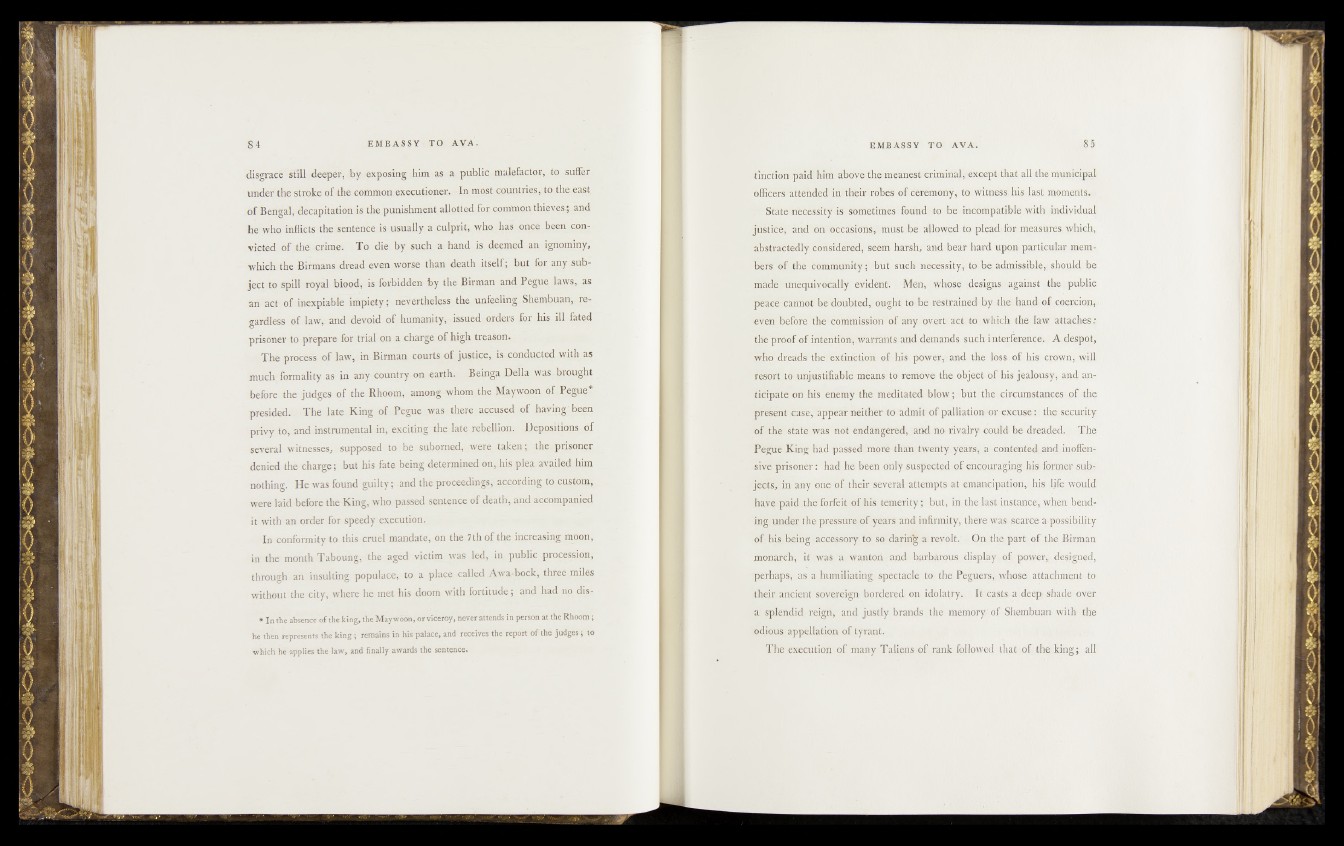
dis.gr.ice slill deeper, by -exposing him as a public malefactor, to.^uj^g
under thè stroke of the common, executioner. In npst.cquntries,d;p.th.e;^ t .
óf Bengal, decapitation is the punishment allotted.for.common thieves^and
hefwho inflicts the sentence is usually a culprit, whq h^-.ppcç been cpn:
victèd of the crime; To die by such a hand is deemed an -igntggtiny,
which thé Birmans dread even worse than death itself > but for, any subject
to spill royal: blood, is forbidden-by the Birman and Pegue laws, as
an act of inexpiable impiety-; nevertheless the unfeeling Sflemhqap,.. regardless
óf law, and devoid of humanity,-issued, orders for ,ljis.,ill fated
prisoner to prepare for trial on a charge .of high treason.
The process of law, in Birman courts-ef justice, is conducted with as
much, formality as in any country on earjth. Beinga l^Æa was,.brought
before the judges of the Rhoom, among whonwthe Maywqon of.Pegue*
presided. The late King of Pegue was there; accused.gof -haying; been
privy to, ancLinstrumental in, exciting the late rebellion. ,J5epositions:.pf
several witnesses, supposed to be suborned, jwere , taken ; the prisoner
denied the charge ; but his fate being determined on, his plea availed him
nothing. He was found guilty ; and the proceedings, according to custom,
were laid before the King, who passed sentence of death, and accompanied
it with an order for speedy execution.
In conformity to this cruel mandate, on the 7 th of the increasing moon,
in the month Taboung, the aged victim was led, in public procession,
through an insulting populace, to a-place called Awa-bock, three miles
without the city, where he met -his doom with fortitude ; and had no dis-
’* In the absence of the king, the Maywoon, or viceroy, never attends in person at the Rhoom ;
he then represents the king ; remains in his palace, and receives the report of the judges ; to
which he applies the law, and finally awards the sentence.
JpflcfioYi pa!idi'hrm Jbo\e the nuanescriirtrrjdlii».e\c1c'p-t<that; all the mumqjjjgl
■officersqiUohdiS^SttflSiirfrobes-'ol- ooremoiiiv; ussy itu.cferhvj'vbvik foments
}f p Suite'tfeccssityAifsmhbt-tmes foundatao, be wtf)rhl^bJo..-^fl'#^ividu:di
jhstree',^lid^dn^oc©a'sdbfis|^llnst;bei#l0WKe^g^l^di^foA^eA8’iKesi^tfisfe,
absTfiaedF} coWfleJi&dl! seem harsh, hard-- uppu pa^culaiSmenjbers
oi^hujcmnmumfy-,; 'but--su< h'necessity .sty boath lissible,
e j f * <I^Ppn, -1 wh^sa,‘|dest>r;ii si; a I r h the (pubjic
'jipileetjs!mtotf j& doubted. "&agJWa(nb^ipstiaixicAb.}vt>^opha'iydilo|^cO{Jgi.ion-,'
-c\enrijefoie ’tbf^cormiiission' Wrfc.t-,to wbichj, th e ^ la ^ ^ it^ lie s ■
tlieq5%jeifi[)l inle‘ntion.£w'i!i%ftWfed dc m at id s rsutd e ffia t m>l e^erfc 0». Ajdcspot,
»$gh| powerj^ffid.> t*h@i'«14sWof hi^t^J^n&Will
resoit to unjustifiable means-to'remove?tfi&;object* (d^his-jcal^ii^vaj.14 anticipate
oil his enemy the-'mcditatedi blow ; but 11 l e t n cum sI ant cs*M#f|he.
prc'senteh-Usc ,appeal neither to ailmit^jhplil'lfafrHiriywi.^ekcuso-j. thpisOtjawe^i
'oL -fhe’^tHte was not endangered, iand,-hofrh-ahyj could lie dreaded. '1 he
P.egue K m g d i Id^uVsc <l^rrrore dia'ri,twenty years-du 0ont(3rted*.apd3iijyHen-
fsW'^fifsonei had he been only susp’cete'dsofifdneout aging his- former
jcctsV on^bf,,their several'attempts, at- emanuji itiori,. his-'f]j.^yipjr{tifl
hirve-p tid ,thO (orleih'.of his temerity ;\b u t; in^ialai'Ur)_stance&vv^ cyif,bypgC
mg undci the pressure of \eais angf infirmity, lhqEefcsvxs*sc>jue4e a-p'gsyij:ul>it\
ofjdll§^hg*accessQrydtdt sa dariri^ a|teyj<dd' Opdlfei.|jar%of ’ this»
monauh, n was a wanton and barbarous display ~olT poster,((dcsi£tied,
fp.^thaps, Us a humiliating spectacle to they Peguct eyvhosc at^u^iin’gri.t&tp
the ir,ancient sovereign bordeied on* idolatry. It casts a deep shade over
a.' s^terj^i^. reign, justly brairds. the.- memory of- Sficni 13uall»pgith the
jodious iappellation of f^ a n t.
'i^lThe execution of 'many. T^Jaqps. of. rank fpJiawetL • that, of, the king; rtlif.